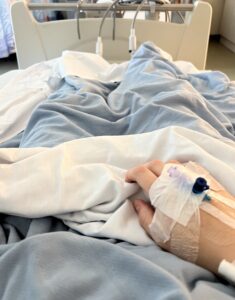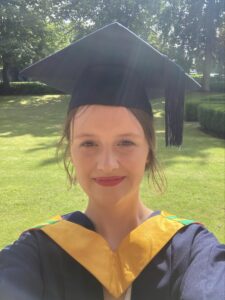Endometriosis is the second most common gynaecological condition for women in the UK, with one in ten women affected. Gynaecology waiting times in England are still significantly longer than pre-pandemic, and a 2024 study from Endometriosis UK showed that diagnosis times in the UK have increased to an average of 8 years and 10 months, an increase of 10 months since the beginning of the pandemic. Mersey News Live spoke with some of the women across Merseyside who are currently receiving care for the condition in order to understand the daily reality of living with the condition – and the battle to get help.
Like many women, I know all too well the challenges faced when seeking diagnosis for a chronic condition like endometriosis.
Since I was a teenager, I have battled with debilitating symptoms such as severe menstrual cramps, pelvic pain, heavy periods, extreme fatigue and joint pain and stiffness. It was only when I turned 23 that I was diagnosed with stage four endometriosis.
Endometriosis is a chronic inflammatory condition where tissue similar to the lining of the uterus grows outside the womb. As the tissue sheds during the menstrual cycle, it cannot escape the body and forms adhesions that can attach pelvic organs to one another over time, causing them to become stuck – a condition called frozen pelvis.
If left untreated, the condition can cause organ damage and infertility.
In my case, the endometriosis tissue had pulled my ovaries behind my uterus, attaching them to my bowel. Endometrial tissue also lined the ligaments around my spine.

Two years year went by before I received surgical treatment in August 2024, where the tissue was shaved from the spinal ligaments, as well as from my bowel and rectum. I underwent a vaginal resection and the organs were separated from each other. Through surgery, I was also diagnosed with adenomyosis, the sister condition to endometriosis that affects the muscle wall of the uterus.
Many women however, wait far longer than I did to receive a diagnosis, or to receive treatment following their diagnosis.
“They completely dismissed me”
Student, Daisy Hawkins, 23 from Liverpool, was diagnosed with endometriosis in September 2024 after suffering with symptoms such as pain, heavy periods, bloating and extreme fatigue since she was in year ten in secondary school, claiming that often she couldn’t walk due to the pain. After Daisy’s mum made her go to her GP for her symptoms, she was placed on the contraceptive pill and mefenamic acid to manage her pain.

She said: “At first they completely dismissed me. They said it’s normal and everyone goes through bad period pain. I had to put in a complaint because I left so distraught.”
Despite consistently complaining to her GP about her ongoing symptoms, it was only two years ago that she discussed the possibility of endometriosis after researching her symptoms online.
She said: “It wasn’t until I had an appointment in June 2023 that they said ‘yes, this could be endometriosis’.
“It’s so frustrating because it’s taken up to ten years to get the diagnosis, and you’re in pain for those ten years, and still afterwards. It’s really frustrating.”
The student was eventually referred to Arrowe Park Hospital’s specialist unit and in September 2024, where she underwent a diagnostic laparoscopy and endometriosis was diagnosed.
“The chronic pain is debilitating”
Mum-of-two, Ceri Bruinsma, 43 from Anfield, requires a double operation after she was diagnosed with a rare form of endometriosis that formed inside a hernia in her abdomen.

After she had the contraceptive implant removed in 2020, Ceri started bleeding from her belly button, with the bleeding getting heavier during each period, until she began to pass blood clots.
She also experienced symptoms such as swelling to her stomach, pain, and fatigue. As a business owner and a sole parent to two children with additional needs, she sought the advice of her GP in 2020 to understand her symptoms, but was informed that endometriosis is “too rare” to be the cause of her problems.
The business owner was prescribed antibiotics and sent for a CT scan, before ultimately being referred to Liverpool Women’s Hospital.
An MRI scan in 2022 showed umbilical endometriosis, a rare form of the disease affecting only 0.5-1% of women with the condition.
Following her diagnosis, she said: “Having umbilical endometriosis has been life changing, from the affect on my mental health and having to fight for investigations into my symptoms, to being treated like passing blood from my belly button is nothing to be alarmed about. The chronic pain is debilitating.
“I am unable to commit to many social events or book holidays because of the unpredictability of the condition and being self employed, if the pain is severe I can’t work and it affects me financially.”
The Anfield mum has an appointment regarding surgery to remove the endometriosis tissue and repair the hernia in May, but is unsure of when her surgery will take place.
“It got to the point where I couldn’t really handle it anymore”
Ash Hamilton, 23 from Birkenhead, was 16 years old when she began experiencing symptoms such as vomiting, fainting, heavy bleeding, and mobility issues. With her symptoms so extreme on one occasion that she was permitted to hospital for blood loss.
She said: “It got to the point where I couldn’t really handle it anymore because the bleeding got so bad.”
Ash visited her GP as a teenager and was put on the combined contraceptive pill in an attempt to repress her symptoms, but was repeatedly prescribed medicines for pain management, rather than attempting to identify the cause of her issues.

She said: “I had many hospital and GP visits and they used to tell me it was normal, it was just a girl problem that I had to deal with.”
In the past two years, Ash’s symptoms have worsened, with regular heavy bleeding between periods, and increased instances of sickness and vomiting.
Earlier this month, after further visits to her GP, Ash was eventually referred to the gynaecology unit in Arrowe Park Hospital where she was placed on the waiting list for surgical laparoscopic diagnosis of endometriosis, eight years after her initial GP appointment.
Emma Cox, CEO of Endometriosis UK, said: “Taking almost nine years to get a diagnosis of endometriosis is unacceptable.
“Our finding that it now takes even longer to get a diagnosis of endometriosis must be a wake-up call to decision makers to stop minimising or ignoring the significant impact endometriosis can have on both physical and mental health. Now is the time to reverse the trend and make commitments to drive down diagnosis time for endometriosis and other menstrual health conditions.”









